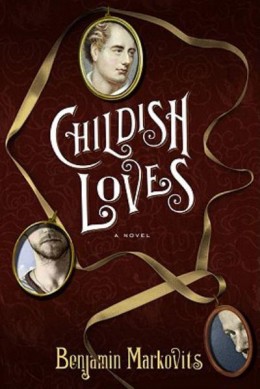 Childish Loves
Childish Loves
by Benjamin Markovits
Norton. 398 pages, $14.95
THIS INVENTIVE NOVEL tells two interrelated stories. In the main one, an author named Ben Markovits is traveling around the U.S. and England in pursuit of information about his recently deceased former colleague, Peter Sullivan, whose writings form the secondary narrative. Sullivan was a teacher at a prestigious New York private school, an eccentric figure with a scandal in his past, but one of Markovits’ few friends as a fellow teacher. After Sullivan’s death, Markovits receives a package containing three fictional tales written by his friend, all well-researched fantasias from the life of Lord Byron. In the course of Markovits’ investigations and journey to publish and promote his friend’s work, he uncovers the details about Sullivan’s relationship with a male student during his time as a teacher in Boston, discovering hidden sides of his friend reflected in these writings.
Sullivan’s fictional stories of Byron explore an aspect of the author’s life generally left unexamined by most biographers. The first tale, “Fair Seed-Time,” is drawn from Byron’s childhood during one of his summer vacations. Lord Grey, “a fair, lively, acceptable-looking young man,” in Byron’s view, has rented Byron’s ancestral home for the summer and makes a lasting impression on the young, cash-strapped nobleman. Much later, Grey invites Byron into his bed, providing the boy with an experience that, while quickly glossed over by the writer, clearly stays with him for the rest of his life. The story carefully balances historical details with rich insights into its characters, especially Byron; he comes across as a precocious, somewhat spoiled child of privilege, not yet “mad, bad, and dangerous to know,” though hints of his future persona do emerge.
The next story, “Behold Him Freshman!,” takes place during Byron’s first year at Cambridge. He spends his time like many of his fellow students: dining out most nights, drinking with friends, and occasionally attending classes. He meets William Bankes, who hires choirboys to sing to him and his friends in his rooms during the afternoons. Of course, there are hints that he does more than just hear them sing. One of these boys, Edleston, becomes attached to Byron, and they spend much time together. An orphan, he eagerly laps up the attention Byron lavishes on him. At the same time, Byron is also engaged in a relationship with Mary, the daughter of a printer who has published some of his poems. Complications ensue when Mary finds herself pregnant and Byron is forced to leave the community, now well on the road to earning his lasting reputation.
The final story, “A Soldier’s Grave,” finds Byron in the last months of his life, leading a ragtag group of adventurers in the struggle for Greek independence. Making his headquarters in Missolonghi and anticipating heroic acts, he instead spends most of his time dealing with infighting and paying off the local authorities. He also becomes heavily involved with a young Greek boy, Lukas Chalandristsanos, to whom he is deeply attached. This, indeed, may be the person that Byron felt the most love for in his life. Sadly, Lukas is clearly exploiting Byron’s affections, stealing money from him and undermining his authority. This chaotic situation, along with his failing health, makes life incredibly difficult for the poet, who nonetheless manages to compose some of the most moving poems of his career.
Markovits makes his research into Byron and Sullivan’s history as compelling as the fictional biography, even when simply exploring library stacks. Childish Loves contemplates the connections between fiction and reality as well as between teachers and students. While leaving full motivation a mystery, it helps sheds light on pederasty, a topic long considered taboo.
________________________________________________________
Charles Green is a writer based in Annapolis, Maryland.





